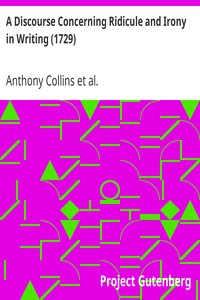A discourse concerning ridicule and irony in writing (1729) by Anthony Collins
"A Discourse concerning Ridicule and Irony in Writing" by Anthony Collins is a polemical work written in the early 18th century. This text critiques the use of ridicule and irony in religious writing and debates, particularly against the backdrop of Collins's own contentious interactions with the Anglican establishment. It seeks to challenge the notion that serious topics, especially those related to religion, should be exempt from humor and irony. The opening of
the discourse introduces the context of a letter addressed to Reverend Dr. Nathanael Marshall, who had advocated for a serious approach to religion that eschews mockery and ridicule. Collins counters this argument, suggesting that such serious discourse often masks hypocrisy and ignorance that deserve to be ridiculed. He asserts that laughter and irony are natural human responses to absurdities in human belief systems, especially in matters of faith. Collins promotes the idea that serious arguments are often intertwined with the use of humor and satire, providing examples from historical and contemporary figures who embraced these rhetorical devices to critique religious issues effectively. This sets the stage for an exploration of the intersection of comedy and serious discourse, illustrating how ridicule can serve as a tool for philosophical inquiry and debate. (This is an automatically generated summary.)
Read or download for free
| Reading Options | Url | Size | |||
|---|---|---|---|---|---|
| Read now! | https://www.gutenberg.org/ebooks/30343.html.images | 244 kB | |||
| EPUB3 (E-readers incl. Send-to-Kindle) | https://www.gutenberg.org/ebooks/30343.epub3.images | 186 kB | |||
| EPUB (older E-readers) | https://www.gutenberg.org/ebooks/30343.epub.images | 188 kB | |||
| EPUB (no images, older E-readers) | https://www.gutenberg.org/ebooks/30343.epub.noimages | 162 kB | |||
| Kindle | https://www.gutenberg.org/ebooks/30343.kf8.images | 452 kB | |||
| older Kindles | https://www.gutenberg.org/ebooks/30343.kindle.images | 407 kB | |||
| Plain Text UTF-8 | https://www.gutenberg.org/ebooks/30343.txt.utf-8 | 198 kB | |||
| Download HTML (zip) | https://www.gutenberg.org/cache/epub/30343/pg30343-h.zip | 181 kB | |||
| There may be more files related to this item. | |||||
Similar Books
About this eBook
| Author | Collins, Anthony, 1676-1729 |
|---|---|
| Editor | Bloom, Edward A. (Edward Alan), 1914-1994 |
| Editor | Bloom, Lillian D., 1920-2002 |
| LoC No. | 70633346 |
| Title | A discourse concerning ridicule and irony in writing (1729) |
| Credits |
Produced by Tor Martin Kristiansen, Joseph Cooper, Stephanie Eason, and the Online Distributed Proofreading Team at www.pgdp.net. |
| Reading Level | Reading ease score: 50.1 (10th to 12th grade). Somewhat difficult to read. |
| Language | English |
| LoC Class | PN: Language and Literatures: Literature: General, Criticism, Collections |
| Subject | Satire |
| Category | Text |
| EBook-No. | 30343 |
| Release Date | Oct 27, 2009 |
| Most Recently Updated | Oct 24, 2024 |
| Copyright Status | Public domain in the USA. |
| Downloads | 480 downloads in the last 30 days. |
| Project Gutenberg eBooks are always free! | |

